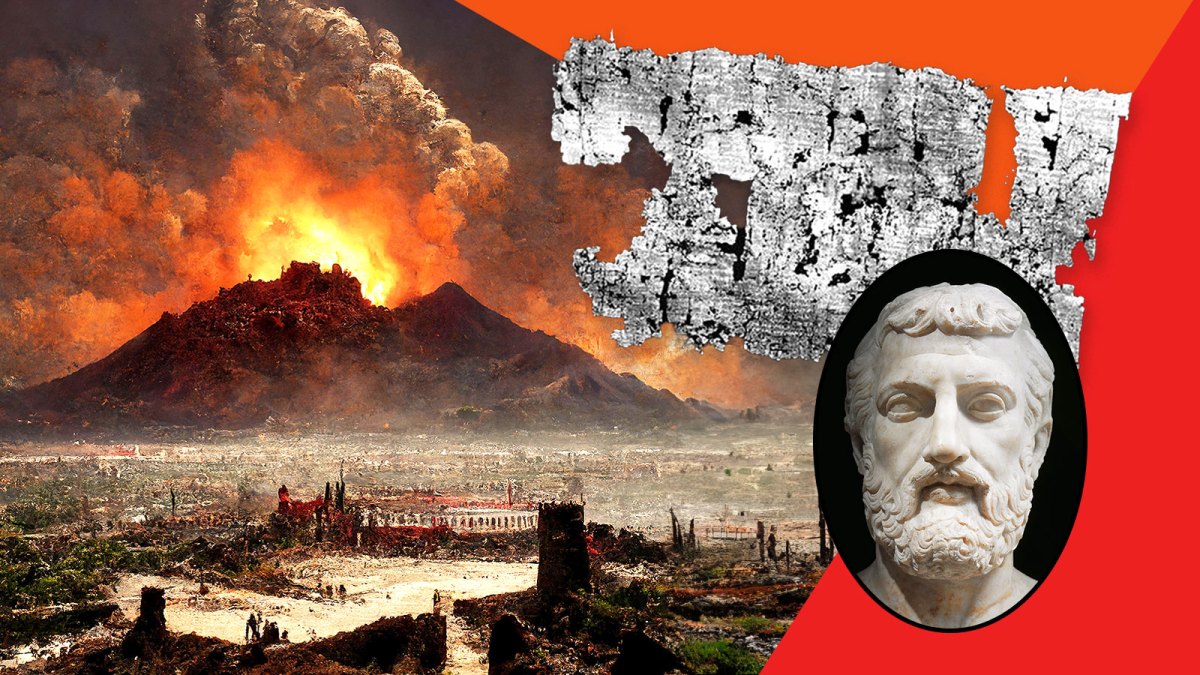Science
Italian Researchers Uncover Lost Insights on Ancient Philosopher Zeno

Italian researchers have made a remarkable discovery that sheds new light on the life of Zeno of Citium, an influential philosopher from over 2,200 years ago. Utilizing a cutting-edge imaging technique, scientists successfully deciphered portions of a charred papyrus scroll that were rendered unreadable due to the devastating eruption of Mount Vesuvius in AD 79. This breakthrough has unveiled previously unknown details about Zeno’s teachings and his role in the development of Stoicism.
Zeno, who lived approximately from 334 BC to 262 BC, is best known for his philosophy that emphasized the importance of reason, virtue, and emotional self-control as pathways to achieving a good life. He famously lectured beneath the painted colonnade known as the stoa poikilē in Athens, a location that lent its name to the Stoic school he founded. His ideas have left a lasting impact on Western thought, influencing notable figures such as Cicero, Seneca, and Marcus Aurelius.
The scroll, which was part of a larger collection buried during the eruption, had long been inaccessible due to its damaged condition. Researchers from Italy’s University of Naples employed advanced imaging techniques, allowing them to read text that had been obscured for centuries. This innovative approach opens up new possibilities for recovering lost works from antiquity, demonstrating the potential for technology to revive ancient voices.
The insights gained from this scroll not only enhance our understanding of Zeno’s life but also provide a richer context for the philosophical landscape of his time. Zeno’s teachings on resilience and rational thought were foundational for Stoicism, a philosophy that continues to resonate in contemporary discussions about ethics and personal development.
The legacy of Stoicism has gained renewed interest in recent years, particularly among modern thinkers and practitioners who seek guidance on navigating life’s challenges. The principles established by Zeno and his followers advocate for a balanced approach to emotions and a commitment to living in accordance with nature, ideas that remain relevant today.
As researchers continue to explore the implications of this discovery, they emphasize the importance of preserving and studying ancient texts. Each recovered fragment contributes to a deeper understanding of historical figures who shaped philosophical discourse. The work done by the Italian team exemplifies the intersection of science and the humanities, as technology breathes new life into the words of long-gone thinkers.
The revelations about Zeno of Citium stand as a testament to the enduring influence of philosophy on human thought and culture. As current and future generations engage with Stoic principles, the teachings of this ancient philosopher will likely continue to inspire discussions on virtue, wisdom, and emotional balance.
-

 Entertainment1 month ago
Entertainment1 month agoAnn Ming Reflects on ITV’s ‘I Fought the Law’ Drama
-

 Entertainment2 months ago
Entertainment2 months agoKate Garraway Sells £2 Million Home Amid Financial Struggles
-

 Health1 month ago
Health1 month agoKatie Price Faces New Health Concerns After Cancer Symptoms Resurface
-

 Entertainment1 month ago
Entertainment1 month agoWhere is Tinder Swindler Simon Leviev? Latest Updates Revealed
-

 Entertainment2 months ago
Entertainment2 months agoKim Cattrall Posts Cryptic Message After HBO’s Sequel Cancellation
-

 Entertainment1 month ago
Entertainment1 month agoCoronation Street’s Carl Webster Faces Trouble with New Affairs
-

 Entertainment2 months ago
Entertainment2 months agoMasterChef Faces Turmoil as Tom Kerridge Withdraws from Hosting Role
-

 Entertainment3 months ago
Entertainment3 months agoSpeculation Surrounds Home and Away as Cast Departures Mount
-

 World1 month ago
World1 month agoCole Palmer’s Mysterious Message to Kobbie Mainoo Sparks Speculation
-

 Entertainment1 month ago
Entertainment1 month agoITV’s I Fought the Law: Unraveling the True Story Behind the Drama
-

 Entertainment4 weeks ago
Entertainment4 weeks agoCaz Crowned Winner of The Great British Sewing Bee, Overjoyed by Triumph
-

 Entertainment2 months ago
Entertainment2 months agoAldi Launches Cozy Autumn Fragrance Range Ahead of Halloween











